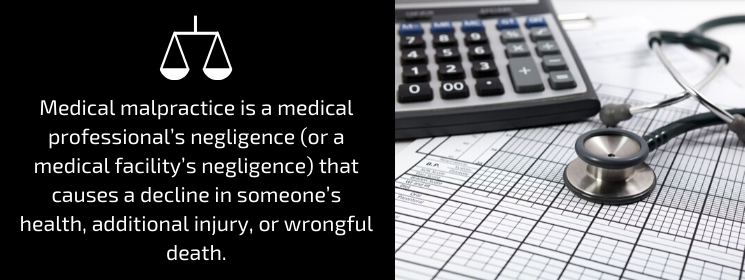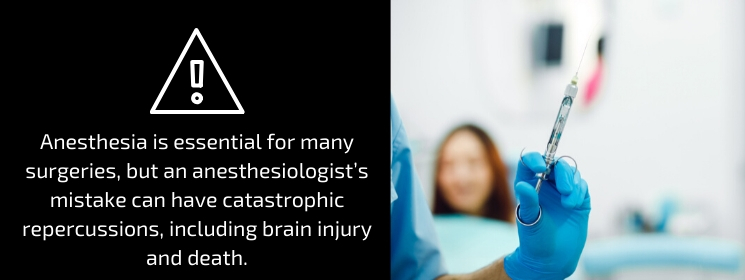The most common types of medical malpractice are misdiagnosis or delayed diagnosis, surgical errors, medication mistakes, and birth injuries during delivery.
Medical malpractice is the third leading cause of death in the United States. That puts everyone at risk. In Illinois, if you are a victim of medical malpractice – or if you’re not sure – the smart step to take is to discuss your concerns with a Chicago medical malpractice attorney.
While malpractice is widespread, and it can happen in almost any medical setting, some medical mistakes happen more frequently than others. You may occasionally see a news story about the wrong kidney or limb being removed, but those stories are news because those mistakes are rare.
What Constitutes Medical Malpractice?
Moreover, a medical professional’s mistake, by itself, does not establish liability. Medical malpractice is a medical professional’s negligence (or a medical facility’s negligence) that causes a decline in someone’s health, additional injury, or wrongful death.
Medical malpractice includes misdiagnosis, medication errors, anesthesia errors, surgical mistakes, and mistakes that cause birth injuries.
The Most Common Medical Malpractice – Misdiagnosis
A negligent doctor may fail to diagnose a condition accurately when a more competent practitioner would have recognized it. Most medical malpractice incidents are incidents of misdiagnosis or delayed diagnosis.
This means that if you are struggling with kidney disease, cancer, or another serious medical condition, you may be one if the twelve million adults who will be misdiagnosed in the United States this year. A misdiagnosis might be caused by a doctor’s failure to:
1. consult the patient thoroughly regarding the symptoms
2. determine the causes of the symptoms
3. screen for particular diseases and conditions
4. properly interpret test results
5. refer the patient to a specialist
A misdiagnosis may mean that a patient’s condition deteriorates until an accurate diagnosis is made, which by then may require costlier treatment and cause greater suffering.
What Conditions Are Commonly Misdiagnosed?
Commonly misdiagnosed medical conditions include cancer, chronic kidney disease, diabetes, staph infection, and asthma.
In Illinois, a medical malpractice claim arising from a misdiagnosis must be supported with expert medical testimony. An attorney can arrange for an expert to explain why a competent practitioner would have diagnosed the patient’s condition accurately and/or earlier.
When a serious medical condition is misdiagnosed, the danger is that the patient will be treated improperly or will be prescribed the wrong medication. If your health declines and you suspect that you’ve been misdiagnosed, let a medical malpractice lawyer explain your rights and options.
When a serious condition has been misdiagnosed, a medical malpractice claim lets the victim pursue not only justice but also compensation for unexpected medical costs, lost wages, and personal pain and suffering.
Medication Errors
Annually, about 1.5 million people in the U.S. are affected by prescription and dosage mistakes. Doctors and other healthcare professionals may have liability for mistakes made in prescribing and providing medications.
Doctors may be liable for prescribing wrong medicines, but a nurse (or medical facility) may be liable for mistakes made while administering drugs. Whenever medication is prescribed, both the doctor and the pharmacist are obligated to ensure that the medication serves a medical purpose.
As mentioned previously, some prescription errors are linked to misdiagnosis, when a drug is prescribed for an inaccurately diagnosed medical condition.
A doctor might also recommend the wrong dosage, or as mentioned previously, a nurse might give the wrong dosage to a patient. In a busy hospital setting, medication might even be administered to the wrong patient.
Anesthesia Errors
Anesthesia is essential for many surgeries, but an anesthesiologist’s mistake can have catastrophic repercussions, including brain injury and death.
Anesthesiologists can give a patient too much anesthesia, fail to monitor vital signs, use defective equipment, or insert a tube improperly into the trachea.
If an anesthesiologist used defective equipment, a medical malpractice victim may also have a legal claim against the equipment’s manufacturer.
Surgical Mistakes
Surgical mistakes are quite rare, although these are the medical malpractice cases that make the headlines. The mistakes made during a surgical procedure can be among the most egregious examples of medical malpractice.
Doctors have performed surgeries on the wrong patients and the wrong body parts. A patient may be injured in some other way by a surgeon’s negligence. A facility’s negligence in providing post-operative care – allowing for a serious infection, for example – may also be medical malpractice.
Birth Injuries
Obstetricians, gynecologists, and other healthcare professionals can cause lifelong problems for newborns if they are negligent prior to or during the delivery procedure.
Birth injuries happen for a number of reasons, but the leading cause of birth injuries like cerebral palsy is a lack of oxygen. When medical providers do not immediately recognize and react to oxygen deprivation, injury or death may be the result.
Cerebral palsy is frequently the consequence of a lack of oxygen during birth. Birth injuries may also include temporary paralysis and broken or fractured bones.
Other mistakes that can happen during childbirth include failures to:
1. respond to signs of neonatal distress
2. order a cesarean when appropriate
3. use forceps competently
4. anticipate other complications like a twisted umbilical cord
What About Medical Malpractice During Pregnancy?
The delivery room is not the only setting where birth-related medical malpractice happens. Injuries may be caused by medical negligence weeks or months prior to birth.
Negligent prenatal care may include the failure to:
1. diagnose a mother with preeclampsia, hypoglycemia, Rh incompatibility, gestational diabetes, or anemia
2. diagnose a condition like neonatal lupus or genital herpes that may be contagious to the child
3. identify a birth defect
What Is An Affidavit Of Merit In Illinois Medical Malpractice Cases?
When an attorney files a medical malpractice claim, the State of Illinois requires that an affidavit of merit must be attached to the claim.
That affidavit declares that a medical authority has been consulted who:
1. is knowledgeable about the medical issues in the case
2. currently teaches or practices (or has within the previous six years) in the field of medicine involved in the case
3. has competence and experience regarding the case’s subject matter
An affidavit of merit must include a statement by the medical authority that there is “reasonable and meritorious cause” for the case to proceed.
Contact Personal Injury lawyers at Philips Law Offices and hire a Chicago medical malpractice attorney who will locate that medical authority and will fight for the justice. Get the compensation you deserve.
Also Read:
Right Personal Injury Attorney
Settlement For Nursing Home Abuse
What Percentage of Car Accident Cases Go to Trial?
Most Common Examples of Malpractice In Nursing
How Is Workers’ Compensation Used in a Case of Professional Negligence?










